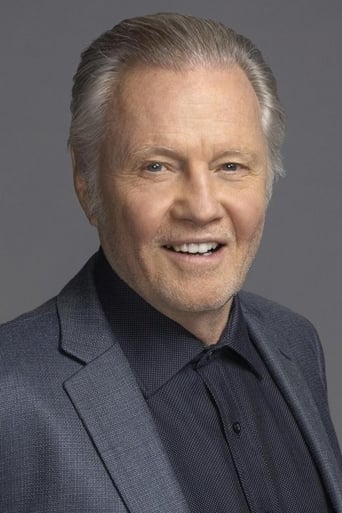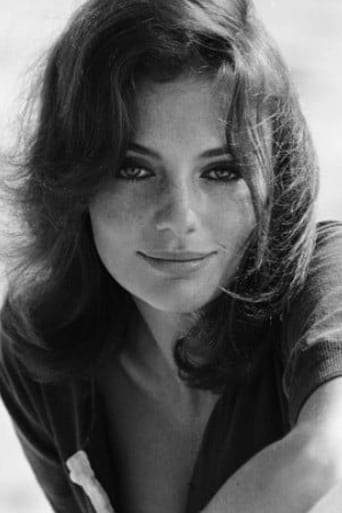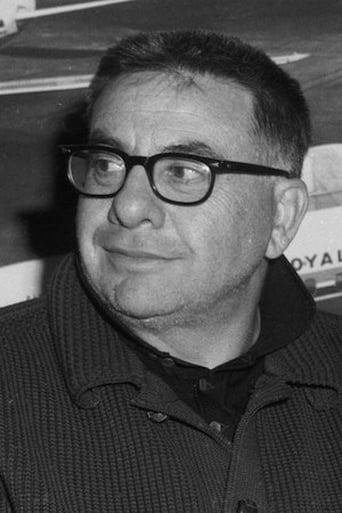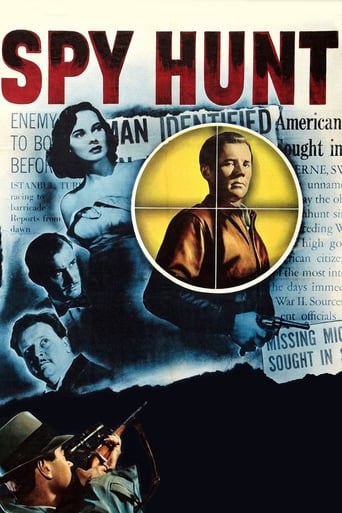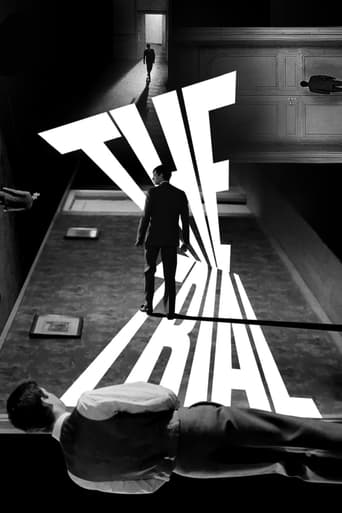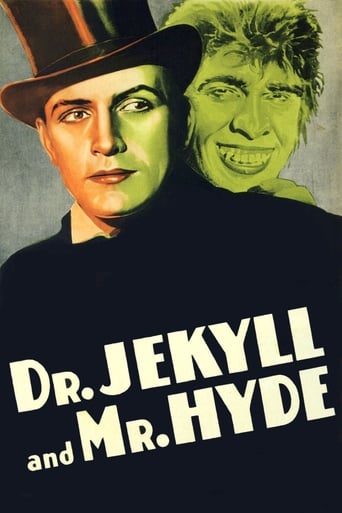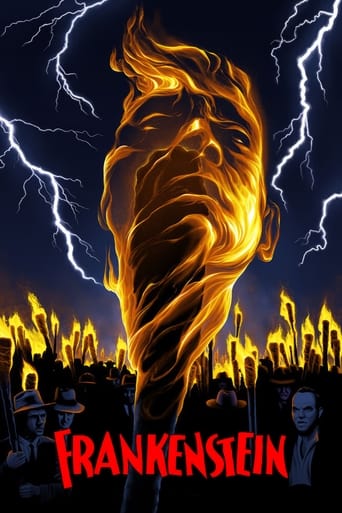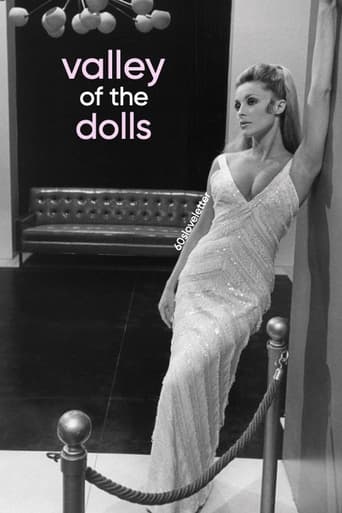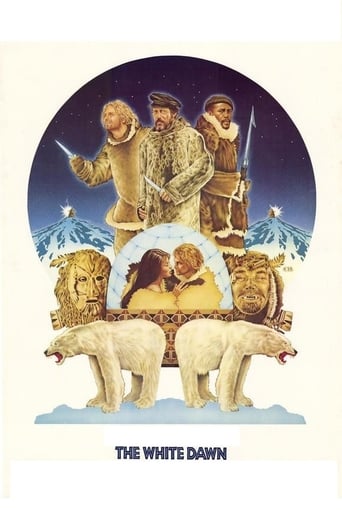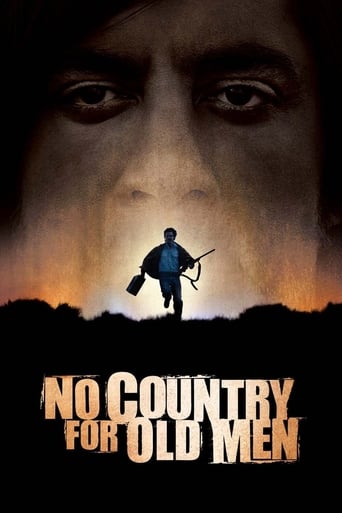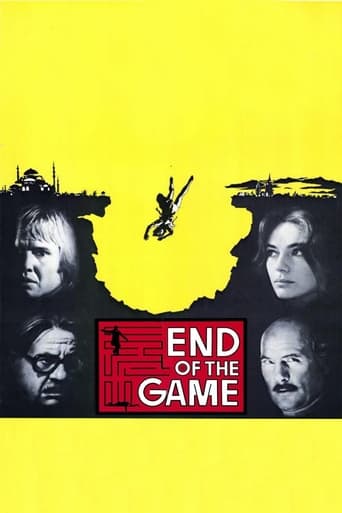
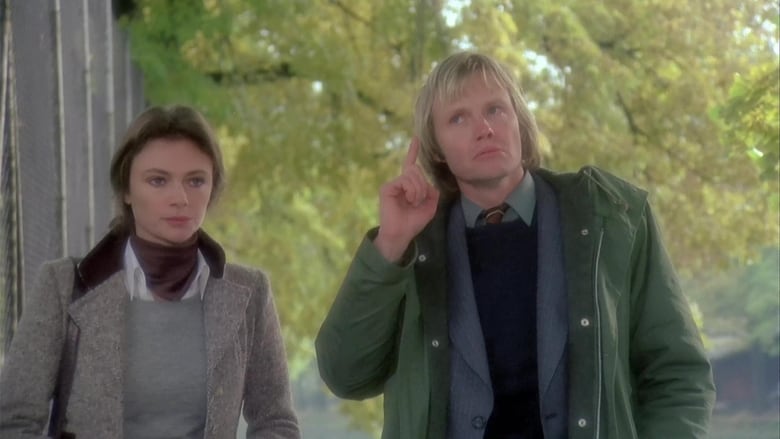
End of the Game (1976)
Hans Baerlach is a Swiss police detective who has dedicated much of his career to pursuing powerful and allegedly murderous businessman Richard Gastmann. Though Baerlach's partner meets his demise while investigating Gastmann, his replacement, Walter Tschanz, is undaunted. Meanwhile, the lovely Anna Crawley becomes involved in the case, which proceeds to take many twists and turns.
Watch Trailer
Cast
Similar titles
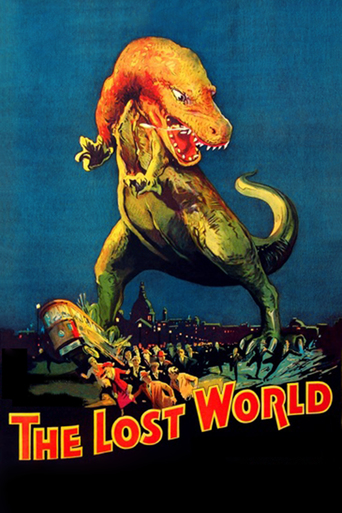
Reviews
Sadly Over-hyped
Pretty good movie overall. First half was nothing special but it got better as it went along.
It's funny, it's tense, it features two great performances from two actors and the director expertly creates a web of odd tension where you actually don't know what is happening for the majority of the run time.
There's no way I can possibly love it entirely but I just think its ridiculously bad, but enjoyable at the same time.
A countryside cop discovers the corpse sitting behind the wheel of a car, having been killed with a shot to the head and decides to cart the body off to the next village. It turns out the corpse (Sutherland) was policeman, Lt. Schmied, assistant of commissioner Baerlach (Ritt), a grizzled veteran, suffering from a stomach disease that will likely kill him within a year. Baerlach investigates and demands a new assistant: young, ambitious policeman Tschanz (Voight). They discover that Schmied had worked undercover, seemingly on in own account, and had investigated a certain Gastmann (Shaw), an ominous "businessman" who was connections with high-ranking politicians and officials. What ensues is a cat and mouse game, which involves not only the current case but a murder that took place decades ago, a bet between two friends, a self-appointed judge and his chosen hangman.I have to admit that Friedrich Dürrenmatts novel "The Judge and his hangman" is among my personal favorites, which I have read countless times (and still enjoy occasionally in the form of an audio-book). As far as adaptations go, Maximilian Schell has it spot on – however, I can understand how people who are not familiar with the novel will find the film awkward, sometimes strangely timed or even sketchy.It is not that Schell is a bad director, but that he had decided to stay very close to the novel: Dürrenmatt (who had a small part as a quirky novelist) is an exceptional writer, who doesn't care much for genres or conventions. "The Judge and his hangman" is not just a mere crime-story but a crime-story that's also a moral play, a pitch-black comedy and a social commentary. In essence it's about the past (or fate, if you want) catching up on people, even if it may be at the end of their lives.Ritt as disillusioned policeman with a past, often reminding off a Swiss Columbo, Shaw as nihilistic, cynic master-criminal and Voight playing his role (very close to the novel) as a man-child with cherub face that a grandmother would probably like to pinch but, like the rest of the characters, seems to have his own secret agenda; the cast is altogether excellent. Bisset, though very pleasant to behold, seems a little out of place (at least in the context of the novel, where her character plays a minor role at best) but Schell does a good job incorporating her into the story. Not to forget: Donald Sutherland must have had a field-day playing the most animated corpse since "Weekend at Bernie's". Story and performances are topped off by an excellent soundtrack of Ennio Morricone. "Once you've heard this music, it will never leave you completely", comments one of the figure on a marching band. I can only agree: I've had the haunting score creep up in my head ever so often for the past 30 years.A final word of advice: I have only watched the original version once and find it rather irritating or unfitting to hear the characters talk in English. In the German synchronization the actors (with the exceptions of Shaw and Bisset) are given throaty Swiss accents, which are way more "authentic".If you expect a run-of-the-mill who's dunnit, you might end up disappointed but as far as adaptations go, few have gotten as close to the source material as "End of the Game" (a title which is true, but I still prefer to call the film "The Judge and his hangman").8/10
At the very opening, we see a Swiss police officer stop beside a parked car on a hillside. The officer opens the door. There is a corpse inside with a bullet hole in his temple.So what does the policeman do? Does he go back to his own car and radio headquarters to report a homicide? Does the police force descend upon the crime scene, seal it off with tape to preserve its integrity, and examine the ground and take photos of the body? No. No, the policeman gets into the dead man's car, starts it up, and drives into town with the corpse nodding beside him. A woman in a passing car is horrified by the sight of the bloody head, so the officer tries to perch his own police cap atop the corpse. The attempt is unsuccessful and the body jiggles and collapses against the dash.Now that's a weird opening for a murder mystery but then this film is something outré from beginning to end. The story, by the well-known Swiss author, Friedrich Durrenmatt, involves no more than the usual number of convolutions and winds up with a surprise ending. But the direction is by Max Schell, a highly underrated actor, who's done some enterprising work as a director too.He opts for a considerably stylized approach to the material. "I think I'm going to croak," groans the police commissioner (Martin Ritt, also an actor/director), sounding more like a man complaining of a hangover. "Well, I hope you feel better!" chirps his assistant, John Voight, in a completely anomalous, cheery tone of voice.Ritt's commissioner really is ill and is schedule for an operation in a short while that may give him an extra year of life. A consequence of his illness is that he can't eat anything or drink any stimulating fluids. Throughout the film, maddeningly, others keep offering him schnapps or a piece of cake, all of which he must refuse until the reveal at the end, when he solves the case and, with gusto, stuffs himself full of soup, wurst, sauerkraut, and huge wedges of Emmenthaler cheese.But, as I say, there are unexpected incidental touches in almost every scene. The initial corpse turns out to be that of another police officer. And we see perhaps two dozen people dressed in dark clothes standing around in the autumnal foliage while someone reads over the casket and a brass band plays a lament. But the threnody take on a subtle, more lively lilt. Soon, some of the mourners are tapping their feet. Then a row of four or five dark figures begin bobbing slightly up and down to the tune, by Ennio Moriconne out of Nino Rota. And that's nothing. An icy rain begins to fall. The mourners are quickly drenched and look as if they're about to freeze. And two more figures come literally dancing down the slope to drop a wreath on the coffin before dancing away. The wreath has the wrong name on it, but as it turns out, the cadaver was undercover and had two identities and whoever ordered the wreath got them mixed up. And so it goes.Sometimes Schell takes the story seriously. There are several shooting deaths. (Only one of them is turned into a semi-joke.) Jacqueline Bissett has the role of the girl who belongs to three men, the evil and egotistical villain Robert Shaw, the corpse, and John Voight's ever-smiling policeman. I can't figure out just what it is that informs Bissett's beauty, what it is that brings her so close to feminine perfection. Certainly her eyes have something to do with it. They slant at an ideal dihedral and they're sometimes blue, sometimes the color of a light turmeric, and as we all know, the eyes are the windows of the occiput. She has a generous bosom but I discount that.Martin Ritt is surprisingly effective as the worn-out, cynical, old cop. His features are over-sized, as are his black-rimmed glasses, and he has quadruple chins, smokes cigars, and his clothes are as shabby as his carefully cluttered apartment. Voight is good too, but then he always is.As a murder mystery, this is pretty sloppy work. As a thing unto itself, it's not at all bad.Madonna, it is always cold, foggy, and cloudy in Bern, hardly a healthy place to live. No wonder the commissioner is ill.
...and Jon Voight is its name. Woefully miscast as a Swiss police officer--no doubt in an effort to secure completion funding--Voight ruins what is otherwise a fine Durenmatt adaptation. The author himself has a cameo role, and Martin Ritt and Robert Shaw are both outstanding. Unfortunately Voight's Beatle haircut and appalling effort at a 'Germanic' accent left this viewer cold. When he's offscreen the film is slowly paced but intriguing. Fast forward through his bits and enjoy what's left, including an odd 'performance' by Donald Sutherland as a corpse.
Aside from this being one of Voigt's finest acting performances, this film has such a compellingly haunting quality, that I haven't been able to get it out of my mind since seeing on the local PBS TV station about 15 years ago.It's a must see for film noir and Hitchcock fans. I found it emotionally gripping much in the same way as did Orson Welles 3rd Man.
